Parsi apex body says final draft is being prepared after consulting priests, religious scholars and senior legal advisors
Article by Ashutosh M Shukla | Free Press Journal India
The Bombay Parsi Punchayet (BPP) has informed the community members that they are seeking “total exemption” from the Uniform Civil Code (UCC). The message was circulated on Friday by BPP trustees. The Punchayet is an apex body of the Parsis representing and voicing the community’s interest.
For the past few days, other members in the community, too, had been voicing their views on UCC, even seeking exemption, more so after news reports that tribals and the north-east region would be excluded.
Trustee: Final draft is being prepared
The circulated message states that a committee was formed of Dasturjis (priests), religious scholars, senior legal advisors and retired judges to advise BPP trustees on the issue. “The committee had several meetings in the last two weeks, said trustees, adding that the final draft is being prepared,” informed one of the trustees, Xerxes Dastur.
The BPP’s message read, “…In summary, our response elucidates the need for the government to grant us as a community ‘total exemption’ from the UCC, supporting our arguments with our unique reasons. Maintaining our ethnic identity and protecting our customs, traditions, and religious practices, which have been the reason for our migration to India in the first place, in gist, is the drift of our arguments in this letter….”.
The message to the community is signed off by all trustees – chairperson Armaity Tirandaz and fellow trustees Anahita Desai, Maharukh Noble, Adil Malia, Viraf Mehta, Xerxes Dastur and Hoshang Jal. The message states that the formal reply to the government will be given before the deadline.
To the media, the BPP issued a different statement that was not as direct in its drift. The statement to the press stated that the core committee was evaluating the implications of the proposed UCC on “traditions, unique religious practices, culture and the ethnic identity” of the microscopic community which migrated to India 1,300 years ago from Persia.
It added, “We are currently in the process of finalising our views, so as to be able to respond to the Law Commission on the proposed UCC within the stipulated time. Needless to state, the Parsis forever have been law-abiding, fully integrated, owing their unquestionable allegiance with the socio-cultural and economic life of India.”
UCC not the best remedy for gender justice: Parsi community
Vocal members of the community and Parsi community, however, have been critical of the UCC, at the same time stating that it is not the best remedy for gender justice. “Sardar Vallabbhai Patel, who led the sub-committee on fundamental rights, had said that UCC is out of the scope of fundamental rights and thus it was kept aside,” said Noshir Dadrawala, former trustee of BPP and a vocal community member who, too, wrote to the Law Commission, seeking that gender-justice be dealt separately.
Parsiana, a fortnight magazine of the community, in its editorial was also critical of the way the UCC was being taken up and called for “change from within”. The editorial stated that rather than coercing or ramming the so-called “reforms”, the government should make endeavour to encourage reforms within communities and provide incentives to those who seek approval for laws that grant parity to women and other disadvantaged sections of society.
It delved into the history of Parsis, court judgements and statements of prominent leaders, including members of the constituent assembly, stating that UCC was not to be enforced. Further stating that while the UCC objective may be laudable, it said that the government needed to give clarity on which community law will the UCC be based on.
The editorial went on to mention, “The Parsis’ fear is based largely on racial and gender concerns. Many oppose the children of Parsi mothers married to non-Parsis being considered Parsis. They are also fearful that adoption would accord the adoptee the rights and benefits of a child born of a Parsi father, or of converts to Zoroastrianism availing of all the rights accorded to born Parsis.”
Parsiana’s editorial adds, “As Justice Frank Beaman noted in his judgment in the historic Parsi Punchayet case of 1908 (also referred to as Petit vs Jeejeebhoy), while the religion and its ritual purity are still the mainspring of communal life, they are intimately bound up with the exclusiveness and the purity of the tribe or caste.”

